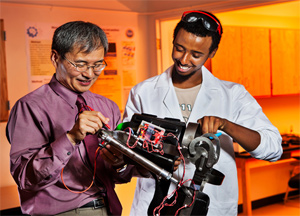Honors College Approved for 2015
The college will grow its enrollment to 1,200 high-achieving students.

SDSU President Elliot Hirshman recently approved the University Senate’s recommendation to create an Honors College on campus.
Set to begin in the fall of 2015, its goal is the eventual enrollment of 1,200 high-achieving students from a wide range of disciplines contributing to a community dedicated to academic excellence.
In his April 21 blog, the president described the Honors College as focusing “on inquiry, engagement, and interdisciplinary problem-solving.” He said participating students will “strengthen our campus culture and lay the foundation for even greater academic aspirations.”
Geoffrey Chase, dean of SDSU's Division of Undergraduate Studies, has worked for years to create an honors college at the university. He says it will improve on the University Honors Program that has existed on campus for decades.
“It will attract more students including out-of-state students and, we hope, international students,” Chase said. “It’s one of those markers people look at when selecting a university, so in terms of how we want to position ourselves as a university on the regional and national scene, I think it's important.”

Taking on challenges
Chase describes the Honors College as an extension of high achievement across a broader swath of the campus, providing more access to more students. He also views it as a way for students to take a more active role in their education.
"The idea is if a student comes in and says, ‘My thing is neurotransmitters or microbiology or prosthetic devices for wounded warriors and I want to do research while I'm here in a lab,’ we say, ‘That's terrific.’"
"Then," Chase continued, "as part of the Honors College, they're going to do a reflection exercise and they're going to sit next to somebody who did leadership and student government who will be sitting next to somebody who did undergraduate research who will be sitting next to somebody who performed in a quintet or somebody who did volunteer work in Guatemala."
“They're being asked to think with each other outside of their majors about bigger challenges and problems like school violence or immigration policy. It creates a community where people come together and say, ‘How do we get at these big problems?’ And that, we know, is going to set these students apart from students who come in and say, ‘Well, I'll just take my courses and graduate.’”
Goals and aspirations
The Honors College will have a live-in requirement for first-time freshmen. It will also require study abroad and a curriculum component requiring seminars and what Chase refers to as “reflection pieces.”
“Asking students to think about why they did something and what they learned from it is the critical next step,” he explained. “So asking a student to go tutor a child in a school or to study abroad is important, but asking them when they get back, ‘What did you learn, how are you different, how has it changed you, how are you going to use what you now know to further your own career and your goals, your advancement, your aspirations?’ That’s key.”
Students already enrolled in the SDSU's Honors Program will be rolled into the Honors College. Although some funding has been earmarked for associate director and half-time adviser positions, Chase says the new Honors College will rely mostly on the current participating faculty and structure of the University Honors Program to get started.
"The Honors College emerged from the strategic plan that President Hirshman had initiated and so it has been invented and has gone up through the process,” he said. “It has been shared widely and the budget has been worked out as we go along and we're making progress.”

Student experience
Currently, students in the Honors Program must maintain at least a 3.5 cumulative grade point average. In the new Honors College, the GPA requirement will be 3.2.
Chase said honors colleges at prestigious universities around the country are lowering their GPA requirements and that it’s a reflection of both employers and universities placing greater emphasis on student experience rather than just good grades.
“Some of our own students who have gone off to the top graduate schools in the country have not had a 3.5, but what they have had is undergraduate research experience or a really strong mentor, they've been engaged in their community or have presented at national conferences as undergraduates,” Chase said.
“All of that is what gets them those positions and we want to make sure we're not narrowing the funnel so much that we're excluding these great students."
In the DNA
Students in the Honors College are expected to represent diversity in all respects, but Chase said they will share commitments to achievement, to giving back to the communities in which they live and work, and to deep engagement.
He said common traits they will possess include curiosity and “not skating on the surface.”
“These are students who say, 'I'm going to get involved,’” Chase said. “They have that spark that says, 'I'm not here just to receive an education. I'm here to create my education.'”
With the Honors College, the dean believes, SDSU is "making a commitment to academic excellence." He sees the university turning out even more highly accomplished alumni, resulting in a great institution becoming even greater.
"We are getting stronger and stronger, so I'm delighted,” Chase says. “It's gratifying and a little humbling to think we've been able to do this on a campus that has been struggling with budget issues and has really had to dig deep to figure out how to get these things done."
“But there's something remarkable in the DNA of this campus. People here have said, 'We're going to do it in spite of budget cuts from the state or in spite of any other issues. We're just going to move ahead and do it.'"
“So I can't wait to see that class of students coming in 2015."



